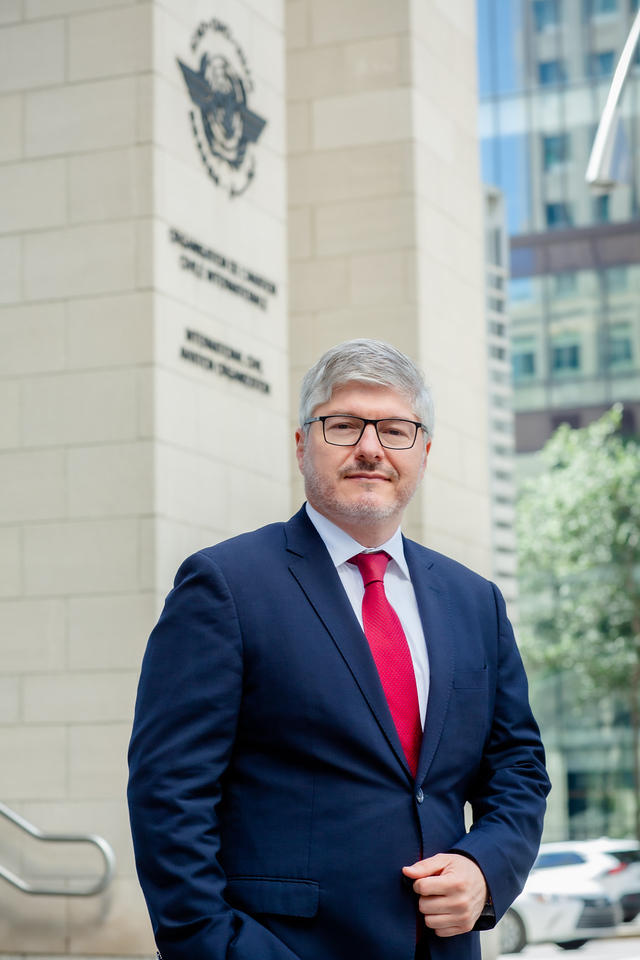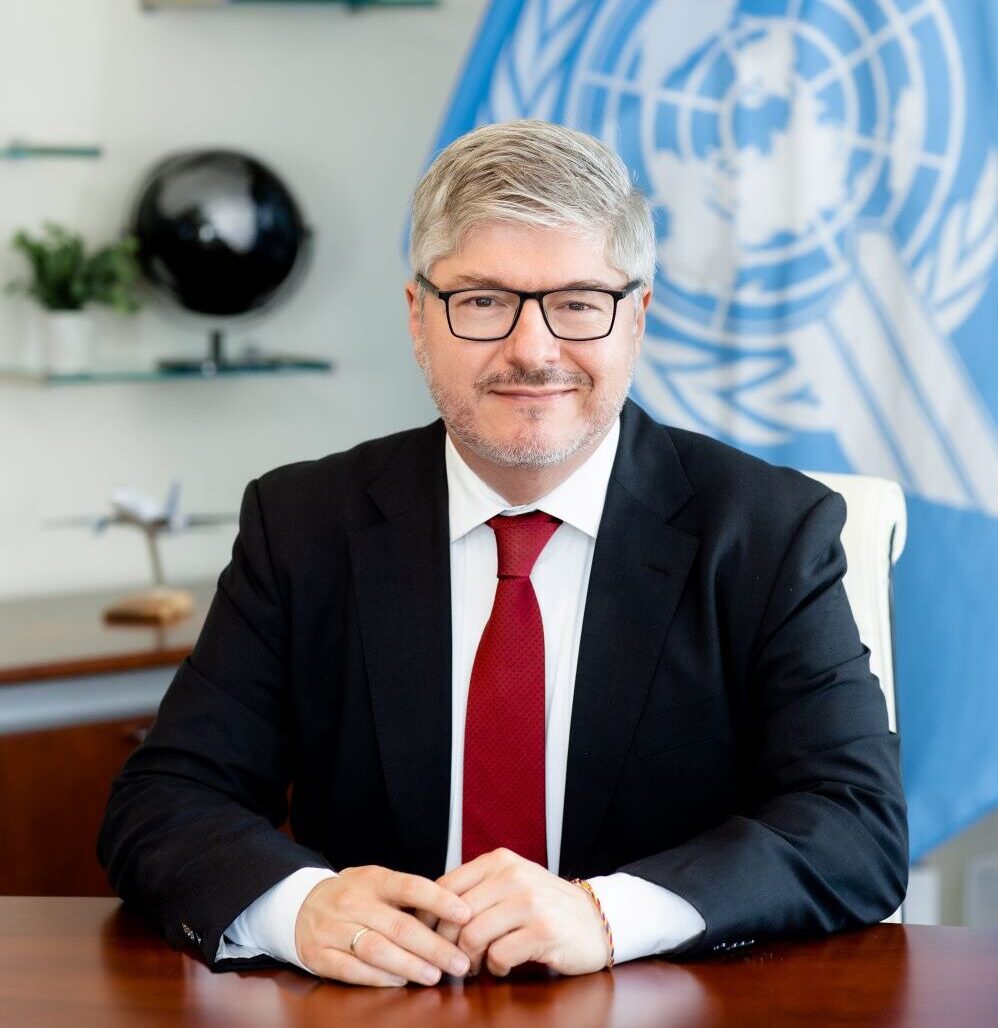Compared to the unprecedented transformations of the first industrial revolutions of Europe, the rapid and global transformations of today’s ‘fourth industrial revolution’ present a moment of great uncertainty and opportunity. We are facing a future that seems to be arriving faster than ever. The aviation industry in particular, having had its own revolutionary impact on travel and communication in the 20th century, today faces a new call for transformation in the face of rapidly changing technologies and risks: from global health emergencies, artificial intelligence, and climate change to space exploration and political uncertainty.
 ICAO, with the support of governments and the wider global aviation community, is embracing this pull towards transformation to become ready for whatever this future holds. This is the story of ICAO’s journey to equip itself better – not only to solve the sticky, persistent challenges of recent years and the newly emerging ones of today – but also to be ready to tackle the next set of complexities and challenges of tomorrow, in whatever shape they take.
ICAO, with the support of governments and the wider global aviation community, is embracing this pull towards transformation to become ready for whatever this future holds. This is the story of ICAO’s journey to equip itself better – not only to solve the sticky, persistent challenges of recent years and the newly emerging ones of today – but also to be ready to tackle the next set of complexities and challenges of tomorrow, in whatever shape they take.
The signatories of the 1944 Chicago Convention, the foundation of international civil aviation, possessed the foresight to envision the sector’s role in shaping the future world. Their vision established an organization capable of leading and uniting a dynamic and rapidly changing world through safe, secure, and sustainable air travel. Today, it is ICAO’s responsibility to honor this legacy by transforming itself to meet the demands of the 21st century and beyond.
ICAO works as a vital organ in a wider dynamic global civil aviation ecosystem. To help adapt to this changing landscape, we must enable our workforce, digital systems, and operational processes to better connect Member States, industry stakeholders and citizens, not only to meet evolving and growing needs and expectations, but to stay ahead of emerging trends so we can all better understand how to mitigate new risks and seize new opportunities that could come to define the future of the sector.
To implement ICAO’s Transformational Objective, over 40 projects have been identified, all contributing to four central outcomes: improving how ICAO collaborates, a transformational shift in organizational culture, enhancing operational efficiencies and effectiveness, and embedding simplified, streamlined processes. Ultimately these projects are geared towards building ICAO’s own capacity to foster more innovation and better collaboration across the civil aviation ecosystem. Several key projects will also have a significant impact on the aviation landscape directly, including:
- The SARPs and Document Management System project, aiming to digitally transform the development and lifecycle management of ICAO’s Standards and Recommended Practices for governments around the world, expanding the space for more collaborative and innovative ways of working.
- The Implementation Support Business Model project: focused on designing and implementing a dynamic and responsive new operating model that creates new and integrated services to Member States, that are more effective and efficient.
- The Partnerships project: seeking to transform ICAO’s approach to working in more open, coherent and collaborative ways, both with our core partners and new ones.
- The Gender Equality project: ICAO is making gender equality a central priority in ICAO: through our programmatic work and services to support States in mainstreaming gender equality in the aviation sector, as well as throughout our own operations and ways of working.
- The Culture Transformation project: in stepping up to one of the most challenging aspects of change in any organization, ICAO is investing in designing a holistic and strategic plan of actions that will empower everyone across our organization to contribute to and benefit from a more inclusive, innovative and adaptive working culture for decades to come.
 Guided by the principles of our One-ICAO approach, the implementation of these and all our transformative projects leverages and integrates the knowledge and expertise found across all our Technical Bureaus, Support functions, Regional Offices, and field projects. We believe that through this transformation process, we will be a stronger partner for all countries and the UN family across the globe, better able to fulfill our privileged role of bringing together diverse perspectives and experiences from across aviation, unearthing hidden innovations and discovering new working methods together that can otherwise be missed when we’re too tied to our established processes and systems. These sorts of adaptive and experimental ways of working also depend on some fundamental upgrades inside our organization too – how we measure results, manage and nurture people’s talents, utilize technologies, and work more securely to confidently and quickly take smarter risks and seize new opportunities.
Guided by the principles of our One-ICAO approach, the implementation of these and all our transformative projects leverages and integrates the knowledge and expertise found across all our Technical Bureaus, Support functions, Regional Offices, and field projects. We believe that through this transformation process, we will be a stronger partner for all countries and the UN family across the globe, better able to fulfill our privileged role of bringing together diverse perspectives and experiences from across aviation, unearthing hidden innovations and discovering new working methods together that can otherwise be missed when we’re too tied to our established processes and systems. These sorts of adaptive and experimental ways of working also depend on some fundamental upgrades inside our organization too – how we measure results, manage and nurture people’s talents, utilize technologies, and work more securely to confidently and quickly take smarter risks and seize new opportunities.
This journey has been made possible by the trust and support invested in ICAO by a growing number of Member States contributing to the Transformational Objective, including financial support from the Republic of Korea, the United Kingdom, the seven NORDICAO States, as well as expert secondments from Brazil and the United States. The successful completion of the Transformational Objective will require sustained support over its three-year implementation (2023 – 2025), and ICAO invites all those interested in contributing to reach out directly to our transformation team. Together, we will reshape and expand the value we can bring to the world, ensuring that ICAO remains prepared for the challenges and opportunities of tomorrow’s aviation ecosystem.
Join us on this journey here!
 Mr. Juan Carlos Salazar was appointed for a three-year term as the Secretary General of ICAO in August 2021. His career in international civil aviation spans nearly three decades in various advisory and leadership roles. Before his appointment as Secretary General, Mr. Salazar served as Director General of Aeronautica Civil of Colombia – Aerocivil. Before joining Aerocivil, Mr. Salazar was a Senior Advisor to the UAE General Civil Aviation Authority for twelve years.
Mr. Juan Carlos Salazar was appointed for a three-year term as the Secretary General of ICAO in August 2021. His career in international civil aviation spans nearly three decades in various advisory and leadership roles. Before his appointment as Secretary General, Mr. Salazar served as Director General of Aeronautica Civil of Colombia – Aerocivil. Before joining Aerocivil, Mr. Salazar was a Senior Advisor to the UAE General Civil Aviation Authority for twelve years.

